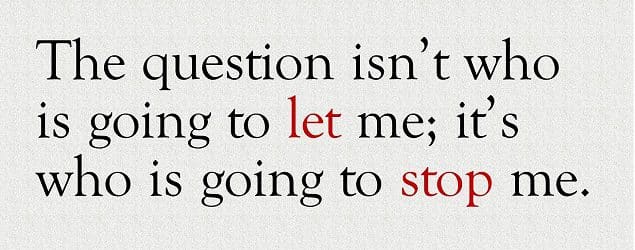At the Heart of the Attacks on Free Speech, an Attack on Reason

In his terrific book The Tyranny of Silence, Flemming Rose, who was at the center of the Danish cartoon crisis in 2006, quotes Saudi cleric and TV preacher Muhammad Al-Munajid’s reaction to the controversy: “The problem is that they want to open a debate on whether Islam is true or not . . . . they want to open up everything for a debate. That’s it. It begins with freedom of thought, it continues with freedom of speech, and it ends up with freedom of belief.”
Keep that quote in mind as you read the following article in The New Yorker: “The Islamist war on secular bloggers in Bangladesh.” The article is a chilling reminder that Islamists agree with Al-Munajid’s disdain for free thought and free speech and that they are willing to express that disdain by killing those who question their religion. We’ve seen this view at work many times before, of course—in the fatwah against Salman Rushdie, in the Danish cartoon controversy and ensuing death threats against the cartoonists and publishers, in the attacks on Charlie Hebdo and Pamela Geller’s Muhammad cartoon contest in Garland, Texas. This time, the attacks are against atheist bloggers in Bangladesh who have the temerity to question religion (not just Islam, mind you. All religion).
Note that these bloggers are not “provocateurs” in the sense in which many intellectuals criticized Charlie Hebdo and Pamela Geller after the attacks on them. Although some of the bloggers’ commentary is biting and satirical, no one could accuse them of engaging in ridicule for the sake of ridicule. (For the record, I don’t think that charge is accurate for any of the Muhammad cartoonists or publishers, either, and even if it were, it wouldn’t justify the attacks and threats against them.) Nor are they “powerful” Westerners “punching downward” at a “disenfranchised minority” as Garry Trudeau and many others claimed of Charlie Hebdo. Quite the contrary. The Bangladeshi bloggers are a small minority of atheists who are questioning and criticizing religion. Unfortunately for them, the dominant religion in their country is Islam and the bloggers are living in a time and place in which a significant number of its followers believe that heretics deserve death.
That is the reason Islamists regularly murder those who disagree with them. They take very seriously an ideology that rejects reality and reason in favor of mysticism and revelation. The true and the good are beyond our comprehension, according to Islam (and all religions). Knowledge is handed down to us by Allah or God or Yahweh, interpreted by His chosen representatives on earth (priests and imams) and disseminated in the form of commandments written in sacred texts. If I may torture a line from “The Charge of the Light Brigade,” ours is not to reason why, ours is just to do or die.
Attacks on thought and dissent by Islamists have nothing to do with alleged “oppression” by the West or the particular form that criticism of their religion takes. It has everything to do with a mystical ideology that mandates death for unbelievers. Anyone who takes that ideology seriously and is committed to following it will come to the same conclusion as the cleric Flemming Rose quoted in his book. It isn’t just particularly inflammatory commentary they oppose. They cannot abide any critical analysis of their religion, because that will naturally lead people to question the entire structure of an ideology that cannot hold up to rational scrutiny. What they oppose isn’t just offensive speech or even free speech as such. They oppose the root of free speech, which is free thought.
Unfortunately, Islamists aren’t the only ones who fundamentally oppose free thought and free speech. On this point, they have intellectual allies in the West, particularly among postmodern intellectuals and their fellow travelers. Consider the following quote:
[A]bstract concepts like free speech do not have any ‘natural’ content but are filled with whatever content and direction one can manage to put into them. ‘Free speech’ is just the name we give to verbal behavior that serves the substantive agendas we wish to advance; and we give our preferred verbal behaviors that name when we can, when we have the power to do so . . . . Free speech, in short, is not an independent value but a political prize, and if that prize has been captured by a politics opposed to yours, it can no longer be invoked in ways that further your purposes, for it is now an obstacle to those purposes.
That’s postmodernist Stanley Fish from an essay appropriately titled “There’s no such thing as free speech (and it’s a good thing too).” (The bolding in the quote is mine). Certainly, Fish is not calling for an attack on those who disagree with him. But he is attacking our very means of agreement or disagreement: our minds. Postmodernists hold that reason, objectivity, and the very idea of free speech and persuasion are illusions. They are all tools of oppression that the “powerful” use to impose their views on the “powerless,” typically through institutions like law and government.
You can find a lot of thinkers today who share this basic view of reason and objectivity and who therefore view Western civilization, especially America, as an oppressive society with racism, sexism, classism and every other sort of “ism” built right into the fabric of the ideas on which our civilization is based. They don’t all call themselves postmodernists, but their approach is very “post-modern” in that they oppose the Enlightenment ideas of reason free will, political freedom, capitalism, industrialization, and the pursuit of happiness. These are the ideas that spawned the modern era.
Postmodern intellectuals attack these ideas at their root by attacking reason, objectivity and the very existence of a reality outside ourselves. (Many are social subjectivists, meaning they believe that reality is essentially created by society, typically through the operation of language.) As a result, they view law and government as inherently subjective institutions incapable of serving universal principles based on objective facts. According to postmodernists, these institutions are not used to protect, but to oppress.
You can see that basic view in Stanley Fish’s comment, above. Or consider the highly influential French postmodernist Michel Foucault, who believed that it is “meaningless to speak in the name of—or against—Reason, Truth, or Knowledge.” “Reason,” according to Foucault, “is the ultimate language of madness.” According to another postmodernist, “[r]eason and power are one and the same.”
If you take these ideas seriously, it is natural to conclude, as Fish does, that free speech is a cruel joke played on the hapless masses who do not know they are being deceived into submitting to the will of a powerful elite that is oppressing them. It also follows that trying to convince people to change their views about social institutions is pointless. As postmodernist Frank Lentricchia has said, the philosophy “seeks not to find the foundation and the conditions of truth but to exercise power for the purpose of social change.” Postmodernists therefore attempt to guide students to “spot, confront, and work against the political horrors of one’s time.” (Several of my references and quotes here come from Professor Stephen Hicks’s book Explaining Postmodernism.)
That is, in essence, what Herbert Marcuse, widely known as the philosopher of the New Left during the 1960s, taught his students, which included many of today’s college professors. Marcuse is one of the first mainstream thinkers (at least in the West) to attack freedom of speech openly, which he did in a 1965 essay called “Repressive Tolerance.” Because Western civilization is inherently oppressive, according to Marcuse, speech should be free for those who oppose freedom, capitalism and the foundations of Western society, but not for those who defend them.
To see the consequences of these ideas, look at what is happening on the postmodernist playgrounds that our institutions of higher learning have become. Students regularly occupy administrative offices and issue lists of demands, they physically bar journalists from observing their public protests (free speech for me, but not for thee!), they disrupt debates and oppose commencement speakers, they call for “safe spaces” to protect them from disagreeable ideas, and they often demand censorship of those ideas. Oppression, inequality, and systemic racism and sexism are the constant refrains used to justify these actions, whether there is evidence to support these claims or not.
Or consider the appeasing attitude among so many Western intellectuals today toward terrorism, in which the terrorists’ actions are explained away and the victims are blamed for “provoking” them. Witness Garry Trudeau’s criticisms of Charlie Hebdo and the PEN award controversy, in which over 100 authors angrily denounced the organization when it presented Charlie Hebdo with an award for courage. Witness the many people, including the New York Times editorial board, who criticized Pamela Geller for “provoking” the Garland attacks. Witness Linda Stasi’s execrable op-ed after the San Bernardino shooting, which lumped one of the victims in with the terrorists on the grounds that they were all “haters” (thus ignoring the difference between expressing one’s ideas with speech and doing so with bullets). Witness the constant use of the term “Islamophobia,” which equates criticism of Islam and its practitioners with an irrational psychological condition.
Fundamentally, what postmodern intellectuals and those they have influenced have in common is an opposition to (and often hatred of) reason. Reality, they argue, is beyond our comprehension and is instead a manifestation of our subjective desires. (Marcuse believed that the ideal society is one in which people have an essentially effortless existence). Western institutions like freedom, the rule of law, and capitalism, therefore, are mere social constructs. Because they lead to oppression, inequality, and poverty, it’s time to construct them differently. As Marcuse summed up his view, “The logic of thought is slavery. Capitalism is freedom which is slavery plus technology. Freedom is a concentration camp. Freedom is slavery.” Not exactly tantalizing prose, but the point is hard to miss.
Americans have been weaned on these ideas since at least the 1960s. Is it any wonder that polls show waning support for free speech? That when terrorists attack us, many of our leading intellectuals express sympathy for them (they are poor and disenfranchised, they feel powerless, they feel oppressed, Israel is bullying them, America has taken all their oil, etc.) or chide anyone who offends them for “provoking” the attacks?
Postmodernists and their fellow travelers don’t come to their views in precisely the same way as Islamists, but the two groups end up in the same place, intellectually speaking. Islamists believe that reality is an illusion created for us by an all-powerful entity called “Allah.” Postmodernists and other prominent intellectuals believe that reality is an illusion created for us by an all-powerful entity called “the State” or “society.” Both pine for an effortless existence (in heaven or at the expense of the rich and powerful who stole this existence from the poor and oppressed). Both believe that the average man cannot understand the world or how to act in it and therefore needs an intellectual elite to tell him what to do. For Islamists, it’s imams. For secularists, it’s Cass Sunstein and other “czars” who will “nudge” us to do the right things.
Certainly, Western intellectuals are not advocating violence. But it’s worth recognizing that when a nudge doesn’t work, a good swift kick is sure to follow. As Ayn Rand said in her essay Faith and Force: The Destroyers of the Modern World: “Anyone who resorts to the formula: ‘It’s so, because I say so,’ will have to reach for a gun sooner or later.” That is true whether the particular faith at issue is religious or secular. And while the secular proponents are not reaching for guns (yet), note that their college protégés seem to be inching ever closer to that point, and there is no shortage of calls for censorship among intellectuals these days.
Defending free speech takes more than the argument that speech or peaceful behavior doesn’t hurt anyone. To defend freedom of any variety requires defending reason and the other Enlightenment ideas as positive and irreplaceable values to human life. It also requires us to reject and condemn irrational ideas from any quarter. Ayn Rand did that. Look to Bangladesh, the Middle East, Europe, and America’s campuses for a vision of what happens, ultimately, if the rest of us don’t.



